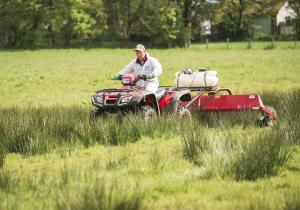Source to Tap Project - Do Agri-Environmental Schemes have an Impact on Water Quality?
Date published:
A new study has demonstrated that for every £1 invested in providing farmers with on-farm advice and implementing the right measure in the right locations, a £3.36 benefit in terms of drinking water quality can be realised over a 30-year period.

A pilot agri-environmental scheme and associated community engagement/education programme resulted in a 24% reduction in the herbicide MCPA concentration in the raw river water abstracted for drinking water treatment.
The findings arise from the Source to Tap project, which is a €4.9M cross-border partnership project aimed at improving water quality in rivers and lakes in the Derg and Erne catchments. This agri-environmental scheme also awarded €1.16 million in grants to farmers to adopt more sustainable land management practices in the 384 km2 River Derg drinking water catchment.
As a result of the scheme the quantity of MCPA lost from land to the River Derg was reduced by 41%, to 26.6 kg in 2021, from what would have been expected in the absence of intervention. The majority of cost savings resulting from this major project were achieved because regulatory breaches in MCPA trigger substantial capital and operational spends for water treatment that could be avoided with effective catchment management. The findings of the study highlight the value of partnership between government, non-government organisations and farmers in addressing agricultural sustainability.
The agri-environmental scheme aimed to enhance raw water quality by reducing pollution from herbicides, sediment-run off and erosion and was implemented by three Catchment Officers working in partnership with local farmers. There are approximately 340 farms in the catchment of which 236 were surveyed, identifying 1700 pressures and resulting in €1.16 million in grants being awarded to 118 farmers. Although Weed-wiping with glyphosate and pesticide storage cabinets were the 2nd and 3rd most popular measures (62% and 64% of applicants respectively), they account for just 7.4% (weed-wiping) and 2.9% (pesticide store) of funding awarded. Only 3% of the agricultural land area was weed-wiped during the project but this was sufficient to contribute to the improvement in water quality that was observed. The most popular intervention was fencing, with 66% of applicants choosing this measure, which accounted for 49% of the cost of the scheme.
The River Derg Water Treatment Works is permitted to abstract 26.6 million litres of water per day to supply drinking water to a population of 41,681 in west Co. Tyrone. As part of the annual review of the NI Water Drinking Water Safety Plan for the Derg catchment, MCPA was identified in 2018 as the most pressing threat to drinking water quality. The monitoring of raw water in the Derg river during the Source to Tap project demonstrated that high levels of MCPA were present, which increase the cost of the raw water treatment process. MCPA is the most frequently used pesticide throughout Ireland for grassland and fodder crops by both spray area and weight. It is highly soluble and does not bind well to soil, and is easily lost to waterbodies following rainfall, especially when applied to poorly drained soil.
Source To Tap is funded by the EU’s INTERREG VA programme managed by the Special EU Programmes Body (SEUPB) together with funding from the Department for Agriculture, Environment and Rural Affairs (DAERA) in Northern Ireland and the Department for Housing, Local Government and Heritage (DHLGH) in Ireland. The Source to Tap project partners are NI Water, Irish Water, Agri-Food & Bioscience Institute, The Rivers Trust, Ulster University and East border Region.
Further Information on the study can be found in the accompanying briefing document or in the final report . Details of the outputs from the project can be found at https://www.sourcetotap.eu).

Notes to editors:
Source to Tap is a €4.9 million collaborative, cross-border project, which aims to deliver a post project website for the protection of source drinking water catchments.In the last five years, the Source to Tap Project has delivered:A €1.16 million investment in on-farm water protection measures on 118 farms in the River Derg catchment. This was delivered by creating a unique, cross-border, pilot Land Incentive Scheme, which has resulted in a marked reduction in the volume of the herbicide MCPA in this source drinking water river.Cutting edge catchment-management science, leading to a new understanding of how the herbicide MCPA moves through and persists in the island of Ireland’s watery landscape.Restoration of over 20 hectares of peatbog that was previously planted with Lodgepole pine using various techniques, including a new method called cell bunding.Design and trial of new, low-cost measures to further reduce the impact of forestry clear felling on sediment loss to nearby rivers and streams in shared source drinking water catchments.A new, online and in-person education programme was developed and delivered to over 1900 upper primary school-aged children. This was designed to widen their understanding of where water comes from, how rivers form, what lives in our rivers, the pressures we place on them and how water is treated to make it safe to drink. In addition, over 40 citizen scientists have been trained to monitor local water quality and empowered to act if water quality is impacted.A post project website www.sourcetotap.eu, underpinned by peer-reviewed science and economic analysis. The various outputs from the project will be made available on this website so that others may learn from and replicate the Source to Tap approach to protecting shared drinking water catchments across the island of Ireland and beyond.AFBI is an arms-length body of DAERA delivering research and development, diagnostic and analytical testing, emergency response capability and expert scientific advice for DAERA and other government departments, public bodies and commercial companies in Northern Ireland, and further afield.AFBI’s Vision is “Advancing the Local and Global Agri-Food Sectors Through Scientific Excellence”.AFBI’s core areas:Leading improvements in the agri-food industry;Protecting animal, plant and human health;Enhancing the natural and marine environment.